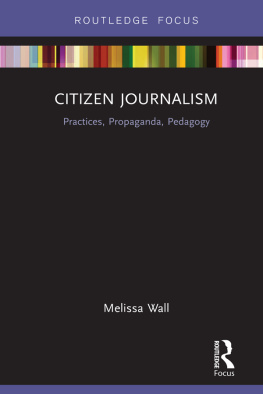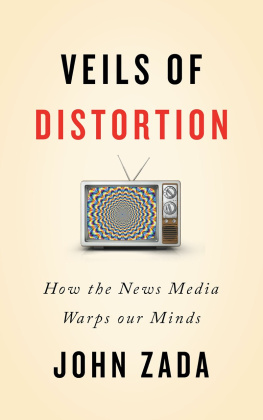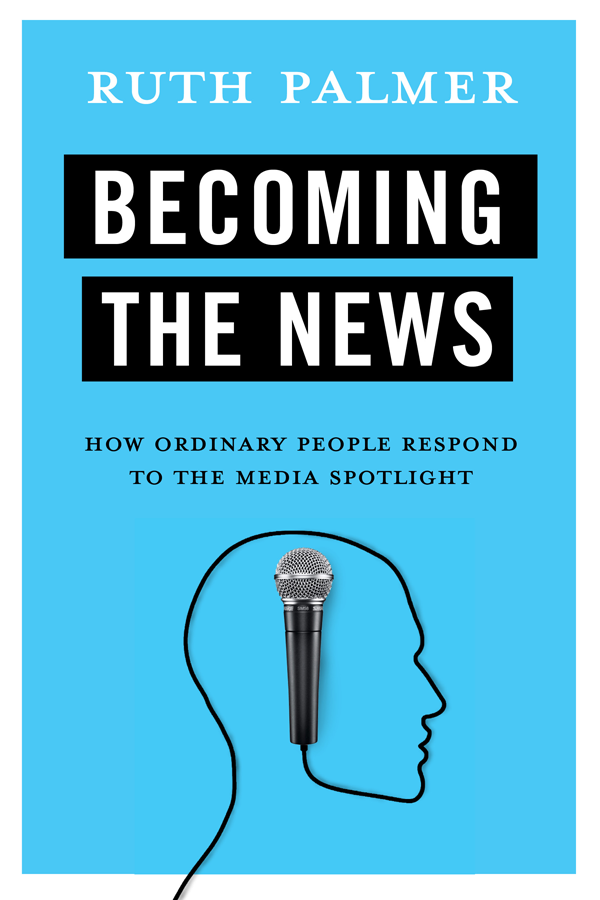Contents
Guide
Pagebreaks of the print version
BECOMING THE NEWS
BECOMING THE NEWS
HOW ORDINARY PEOPLE RESPOND TO THE MEDIA SPOTLIGHT
RUTH PALMER
Columbia University Press
New York

Columbia University Press
Publishers Since 1893
New YorkChichester, West Sussex
cup.columbia.edu
Copyright 2018 Columbia University Press
All rights reserved
E-ISBN 978-0-231-54476-4
Library of Congress Cataloging-in-Publication Data
Names: Palmer, Ruth, 1979 January 16
Title: Becoming the news : how ordinary people respond to the media spotlight / Ruth Palmer.
Description: New York : Columbia University Press, 2017. | Includes bibliographical references and index.
Identifiers: LCCN 2017011442 (print) | LCCN 2017027153 (ebook) | ISBN 9780231183147 (cloth : alk. paper) | ISBN 9780231183154 (pbk.)
Subjects: LCSH: Reporters and reporting. | Attribution of news. | JournalistsInterviews. | JournalismObjectivity.
Classification: LCC PN4871 (ebook) | LCC PN4871 .P36 2017 (print) | DDC 070.4/3dc23
LC record available at https://lccn.loc.gov/2017011442
A Columbia University Press E-book.
CUP would be pleased to hear about your reading experience with this e-book at .
Cover design: Noah Arlow
FOR MY PARENTS,
ANN AND CHARLES PALMER

CONTENTS
A s a college student I had a summer job delivering electric fans to the poor in Austin, Texas. I believed in what I was doing: fans in that dripping heat could save lives. The fan drive was run by a nonprofit and, thanks to a scrappy public relations person, it had received a fair amount of media coverage. I was happy to hear the project plugged on the radio because it brought in donations and volunteers, but I also found it thrilling. I remember sitting up straight when the PR guy said a local disc jockey had invited one of us down to the station. All my friends would hear me! Sure, Id be nervous, but Id be famous! The executive director took the gig. Fame slipped away.
My turn finally came when I was told a reporter from the Daily Texan , the University of Texas student newspaper, wanted to do a story on us, and could she join me on one of my deliveries the next day? This was it. Not the journalistic big leagues, but you had to start somewhere. I wasnt a UT student, but I knew a lot of folks who were, and a lot of peopleneighbors, former teachers, my parents friendswho picked up that paper on campus. I felt nervous and excited. I practiced being articulate about the cause.
I felt both jittery and disappointed when I met the reporters. They looked like regular college students. But there were two: a reporter and a photographer. That felt special. Someone suggested that, instead of handing the fan to the person who answered the door, I might go inside and set it up. I didnt normally do that, but okay. The photographer took pictures and the reporter asked a few questions. It was over very quickly. I remember thinking I hadnt completely blown it but that somehow the whole thing had not gone quite the way I had anticipated; like I had expected to be the director of the scene but wound up just a minor player.
Then I waited. Finally, a neighbor brought a bunch of copies for my parents, who must be very proud. They were. But I stared at the front page with a mix of horror and fascination. There I was, face enormous in mealy newsprint, neck divided cruelly by the fold. Thick arms, thin lips, pursed in concentration. So this was what I really looked like. I knew that must be me, but I didnt recognize myself. And the quotesthe quotes were the worst part. Yes, I had sort of said those things. The gist was there, but the grammar was off. I sounded weird. Not like me. Somehow the article got everything and missed it all at once. People would think I was an idiot.
They didnt. They posted the article at work. Friends called with congratulations. My parents pile of newspapers grew. I felt both sheepish and proud. Between the praise and my inability to pinpoint exact errors, I didnt feel I could complain or ask for a correction.
Copies of that article are still stashed somewhere in my parents house, probably the attic. It would be hard to find it now. That was the year 2000. In some ways, making the news has changed since then. In many ways, it is the same.
T hank you to the eighty-three people who shared their stories with me for this study. Your generosity inspired me throughout this process and I continue to learn from you.
Thank you to Columbia University Press, especially Philip Leventhal, my editor, and the anonymous reviewers for their time and helpful feedback.
Im grateful to my professors at Columbia who supported this project from the beginning. Many thanks to Todd Gitlin, whose own work inspired this study, for his tireless guidance and for helping me believe it could be a book. I am indebted to Michael Schudson for invaluable advice on this project when it was in its infancy, and as I moved it to adulthood. My deepest gratitude to Andie Tucher for guidance intellectual, literary, and personal, and for crucial feedback at key moments. Many thanks to Robbie McClintock for modeling a life of inquiry and teaching.
A special thanks to Frank Moretti, a close mentor and friend throughout my time at Columbia. He died before this book was finished, but his influence is everywhere in it.
Thanks to my friends and colleagues from Columbia Journalism Schools PhD in Communications Program. I especially want to single out Danielle Haas and Rasmus Kleis Nielsen, who gave invaluable feedback at every stage of this project. Many thanks as well to C. W. Anderson, Soomin Seo, and Katherine Fink. They all read sections of this work and were exceptionally generous with feedback, encouragement, and companionship. Thanks, too, to Sarah Stonbely, Katherine Brown, Lucas Graves, Kirsten Lundberg, Annie Rudd, Julia Sonnevend, Ri Pierce-Grove, Laura Forlano, Zohar Kadmon Sella, Colin Agur, and Ben Peters for contributing in ways direct and indirect with their ideas and friendship. Thanks to the Mellon Interdisciplinary Fellows Program at Columbias Interdisciplinary Center for Innovative Theory and Empirics (INCITE) for critical funds, work space, and community.
I am deeply grateful to my colleagues at IE University in Segovia and Madrid for giving me space, ideas, and just enough pressure to see this project through, especially Vincent Doyle, for research Wednesdays and sanity; Juana Abanto, Mara Jos Ferrari, Javier Gonzlez, Pamela Rolfe, David lvarez, Diana Gmez, Nuria Santana, and Mnica Bartolom, for ongoing intellectual and personal encouragement; Begoa Gonzlez Cuesta, Luisa Barn, Miguel ngel Gabaldn, and Ina de Macedo, for gracious leadership and logistical, moral, and financial support.
For perspective, companionship, and good cheer, thanks to my close friends Julia Walker, Emily Alexander-Wilmeth, Steve Eichinger, and Jenny Rhodes in New York; Colleen McMillon, Beth Schmierer, Laura Guijarro, and Almudena Gonzlez del Valle in Madrid; Emily Yamada in Seattle; and Mollie Webb in St. Louis.
And thank you to the Palmer clanAnn, Charles, Stephen, Ann S., Benjamin, and Henryfor their love and support, and my education.
Like the credulous widow who wakes up one day to find the charming young man and all her savings gone, so the consenting subject of a piece of nonfiction writing learnswhen the article or book appearshis hard lesson.









